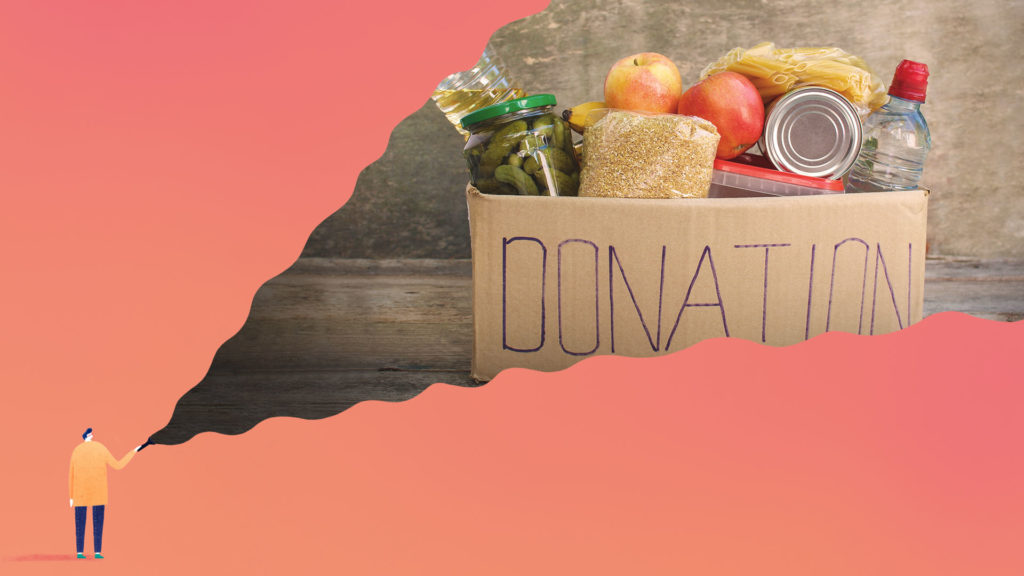Welcome back to One Good Thing. Part do-gooder spotlight, part travelogue, part humor column, this series captures the journey of award-winning novelist and filmmaker Owen Egerton. You may recognize Egerton as one of the hosts of the Texas Optimism Project’s monthly podcast, The Good Newscast—an extension of what we hope to accomplish with One Good Thing.
Right now, I have an urge to do nothing but protect my family. I want my pantry full, my finances in order, and for the rest of the world 50 feet from my children. I’m sure I’m not alone in this gut desire to ward off the world. But a better voice whispers, reminding me that need expands beyond my walls and the definition of family is broader than blood.
Despite the call for isolationism, we’re better when we’re invested in each other’s well-being. We feast when we feed another. The pandemic has highlighted heroes who are serving their communities:
Heroes working the hospitals, fire stations, and life flights;
Delivering our mail;
Stocking our grocery store shelves;
Working the food pantry and shelters;
Preschool teachers leading dance parties on Zoom;
Counselors reaching out on the phone to clients;
Artists of all kinds sharing their work;
Hobbyists learning how to sew masks.
Their example inspires me to start with a question: Who is in need, and how can I help?
The sick. The poor. The lonely. Those with no home in which to hunker down. Those with no family in whom to take comfort. How do you reach out while simultaneously keeping a social distance?
I find I don’t have an answer. So many want to do something—anything—to help. Some way to ease the hurt of those around us. What should we do?
The answer is in flux, just as the world in flux. We don’t yet understand where we are, so we may not yet know how to help. Pessimism wants to say there is no answer, so you can stop asking. Optimism, though, offers no such reprieve. The answer may be elusive, but the question still stands. And the question is essential.
Who is in need, and how can I help?
So we ask the question and we listen for the answer. We step away from the noise of news and the static of panic, and we listen for opportunities.
Karen Fry, owner of Dream Bakery, in Austin, listened. She and her team discovered that although there were fewer orders for baked goods for weddings and celebrations, people were very interested in bags of flour for home baking. She started ordering more food staples—eggs, milk, coffee. She transformed her popular bakery into a grocery supply selling to grateful customers and donating food to those in need.
Texas writer Cathy Chapaty is also listening. She made a pledge to reach out to ten people a day via a note, text, or call, just to see how they’re doing. Her efforts highlight how, in a time of necessary distancing, we still very much need to be social.
Headwaters high school theater director Megan McQuaid knew her student actors were disappointed to not be performing their musical this spring, so she organized an online musical karaoke party for the students and their families. For one night, a dozen living rooms shined like the lights of Broadway.
There are countless kind deeds happening, from home-sewn masks for neighbors, to financial advice to a friend, to tipping generously online. The sympathetic word, friendly smile, simple wave can be a balm to a hurting person.
As we ask who is in need, there will be times, many times, when the answer is ourselves.
Heed that answer. Give yourself what you need.
Maybe you’re feeling horribly alone. Don’t be afraid to say it aloud. To ask for help, speak your need, and share your fear. Don’t hesitate to call a friend in the middle of the night.
Maybe you’re hunkering in a full house and you’re starving to be alone. Maybe you want a nice, long shower. Or a one-person dance party, or streaming rom-com, a casserole-sized ice-cream sundae.
Knowing that fostering kindness and practicing awareness will prepare us for the changing answers in a world in transition.
Or, if you’re like me, sometimes you just need to cry. It’s not as if there’s a correct way to be reacting to all this. It’s a new situation and we’re all stumbling forward together. Being generous to yourself takes courage, and taking care of yourself is a valuable act of kindness.
It has always been the case, but the pandemic is making it increasingly clear: we are in this together. Our kindness, our courage, our willingness to ask for help will shape this time. So we call a friend, we check in on loved ones and neighbors and strangers, we treat our family, friends, and ourselves with as much patience as we can. And when that patience falls short, we forgive ourselves and those around us. We continue to ask, Who is in need, and how can I help? Knowing that fostering kindness and practicing awareness will prepare us for the changing answers in a world in transition.
– Owen
Illustration by Mark Conlan.
